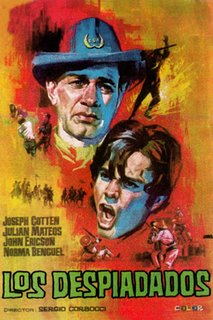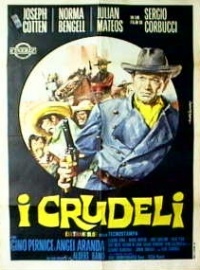The Hellbenders Review
1967
Dir: Sergio Corbucci
Cast: Joseph Cotton, Norma Bengell, Julian Mateos, Gino Pernice, Aldo Sambrell, Al Mulock, Angel Aranda, Maria Martin, Claudio Gora, Benito Stefanelli, Enio Girolami
Music: Ennio Morricone
Corbucci had a love-hate-relationship with most of the people he had ever worked with. When both Manolo Bolognini and Albert Band/Alfredo Antonini proposed a project to him, to be executed in the last months of '66, he was still at odds with Bolognini, producer of Django, so he accepted the offer made by the latter, whom he had called a half idiot only two years before, when working on Massacro al Grande Canyon. Many have sustained that this was not a wise choice: producer/co-writer Band held strong control over the execution of the material, leaving Corbucci little headroom for his idiosyncrasies. The result is a film that - for most part - doesn't really feel like a Corbucci movie and is often overlooked, even by some of his most loyal fans. On the other hand it has a small but fervent cult following and some have even called it his best film.
Like for his previous film, (The Tramplers), Band had lifted some elements of his story from a novel by William Cook, Guns of North Texas, about a stubborn southern patriarch who didn't want to give up the fight after the Civil war was over. It was an idea that appealed to Corbucci too, although he most probably saw it more as an allegory on fascism and Mussolini's Empire in the North, in the last stages of WW II. The film opens with Renegade Confederate officer Jonas (Cotton) and his three sons steeling a shipment of Yankee gold in the aftermath of the Civil War, butchering the entire regiment transporting it. With the money, Cotton want to revive the Confederacy, somewhere up North, across the Hondo River. The money is hidden in a coffin, and an alcoholic prostitute (Martin) has been hired to serve as the 'dead man's widow'. The sequence in which the Yankee regiment is slaughtered, could well be the most elaborated rendition of a massacre before the famous opening of Peckinpah's The Wild Bunch (1969). It's probably less graphic than the violent showdowns in Django, but I always had the feeling that the violence in that movie is of a surrealistic, even slightly cartoonish nature, which tones it down considerably. The violent opening of the Hellbenders is clinical, cold-blooded, and so incredibly strong, that the rest of the movie looks a bit tame, even though Cotton and his men are under constant threat of discovery. When the alcoholic Marin is killed by Cotton's crazy son Jeff (Pernice), the group is in need of another 'widow'. In a saloon, his 'good son' Ben (Mateos) meets Claire (Bengali) and takes her under his protection when she is caught cheating at playing cards. She'll be the new widow, but soon discovers she has joined an insane enterprise. Most of the scenes to follow are tension-filled, but like the art critic Howard Hughes has written, tension is not what this director does best or what his audiences expect. There's the odd feeling that too much has been undertaken to keep the story moving, especially in the final half hour, when Mexicans, Indians and a rescuing Yankee regiment are thrown in, until Corbucci hits the right cord in a quite abrupt, but well-prepared and well-executed finale.
Some critics have complained that it's very hard to feel any sympathy for Cotton and his sons (with the possible exception of Mateos). This is probably due to the different intentions Band and Corbucci had with both the story and its characters. To Band Cotton most certainly was a tragic character, stubborn and unwise maybe, but still worth of some respect. Corbucci made a idiot out of him, more in line with his ideas about Mussulini and fascism. In the meantime, with the emphasis on both 'cause' and 'family', it definitely was an Italian story to both men. Cotton knows that his crazy son Jeff will put the cause in jeopardy, but cannot decide to send him away; his good son Ben, on the other hand, understands that his father's cause is reckless and will probably lead to the downfall of the entire family, but still can't say goodbye to him. Both feel this strong loyalty to cause and family (often interchangeable conceptions) that almost inevitably rules over better judgment, and is rather typical for Italian culture and society: it may be a bad cause, but it's our cause, cosa nostra.
The Hellbenders certainly is an intriguing movie. I'm more with those who love it than with those who tend to neglect it, although I don't think it's in the upper echelon, with the likes of The Great Silence (Il Grande Silenzio) or The Mercenary (Il Mercenario). Its assets outweigh its shortcomings, but between that delirious opening and devastating finale there are too many scenes that don't quite work or are simply mediocre. Constantly in danger of being exposed, most of the group's narrow escapes are due to sheer luck or a quite abrupt change of mood among the people interrogating them. The film is not only different from Corbucci's other movies, it's has also little in common with most other Italian westerns set in the aftermath of the Civil War. The good, the Bad and the Ugly (Il Buono, il Brutto, Il Cattivo) probably was an inspiration (the final twist refers to the famous churchyard scene of that movie). Others have drawn attention to Robert Aldrich's Vera Cruz (1954), in which a shipment of gold was hidden in a stagecoach. But both in subject and execution The Hellbenders differs from those movies. It may be a hard to feel much sympathy for the characters, but it can't be denied that performances are strong: Cotton is totally believable as the stubborn, obsessed patriarch, and so are Pernice and Mateos as his sons. Brazilian actress Bengali burns the screen while sowing discord among the family members, and there are nice cameos for spaghetti regulars Aldo Sambrell, as a Mexican bandido, and Al Mulock, as a crazy beggar who kills the group's horses, causing - indirectly - the dramatic finale in which the family members wipe out each other in an outburst of rage and frenzy. Maestro Morricone once more delivers the goods with a wonderful atmospheric score, highlighted by a hypnotic trumpet solo. It'll make you shiver.
Reviewed version: the film is part of the 3DVDs/9FILMS-box of St. Clair Entertainment. The transfer is mediocre at best. It's fullscreen and colours have faded here and there, but print damage is reduced. I also had a look at a DVDr one of the forum members sent to me. Apparently the same video source was used, but instead of faded, colours were terribly over-saturated. The best way to watch the movie, probably is the R1 Anchor Bay release. You can find Sebastian's review of that DVD right here
--By Scherpschutter





